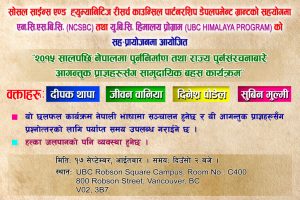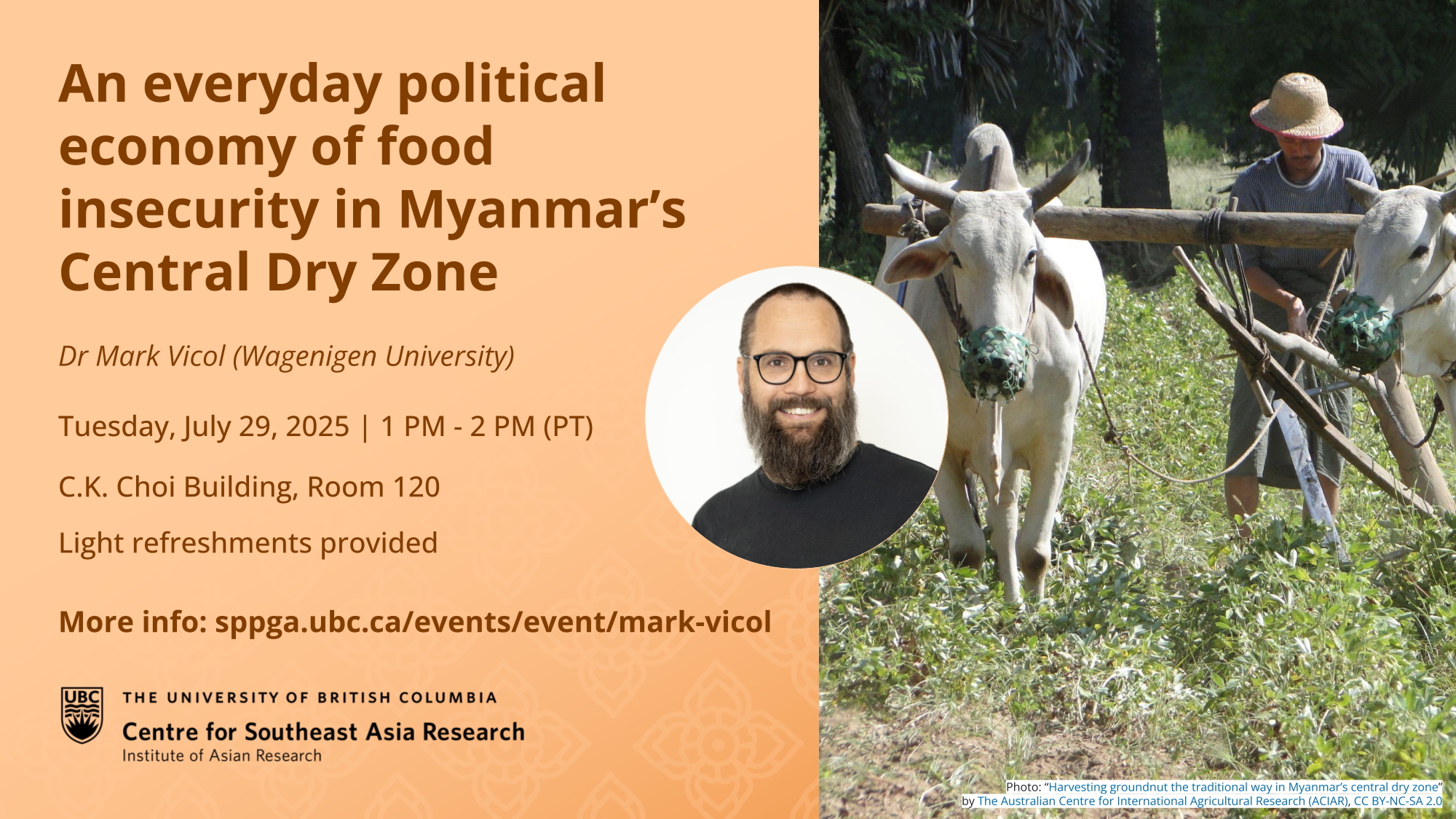Please note that this discussion will be held in Nepali, with Q&A to follow. Light refreshments will be served.
Sept. 17, 2017
2:00 pm
Please RSVP for this event here.
Parking details here.
Please see directions to the UBC Robson Square Campus here.
  |
About the speakers:
Jeevan Baniya is a Researcher at Social Science Baha, a not-for profit research organization in Nepal. He is also a teaching faculty at MIRD and CPDS Tribhuvan University where he teaches master’s degree courses in State Building and State Failure in the Developing World, Public Policy and Governance, Comparative Politics and Development Studies. He worked as a research fellow at the Nautilus Institute (Seoul Branch) and Democracy and Social Movements Institute (DaSMI), Sungkonghoe University, Seoul, South Korea. He also briefly worked for the National Reconstruction Authority (NRA), the Government of Nepal, as a Social Inclusion and Grievance Management Advisor for the Rural Housing Reconstruction Programme (RHRP). He has published on state and society relations, inclusion and exclusion, conflicts and peace, gender, politics and development, governance, labour migration, disasters. Currently, he is involved as a Co-Investigator in the AHRC-funded research project, ‘After the Earth’s Violent Sway: the tangible and intangible legacies of a natural disaster’ at SOAS, London.
Subin Mulmi is a Lawyer and Researcher working on issues related to human rights. His research work includes studies on subjects such as citizenship, legal identity, gender, affirmative action and statelessness. In particular he was one of the researchers for studies on ‘Acquisition of Citizenship Certificates in Nepal: Estimation and Projection’ and ‘Legal Analysis of Citizenship Laws of Nepal’. He is currently engaged in the research on ‘Women’s ownership of land and house, and its impact on their economic empowerment’, ‘Acquisition of birth registration and other vital events registration certificate in Nepal’, and ‘Women’s special opportunities in Nepal’.
Dinesh Paudel is an Assistant Professor in the Sustainable Development Department at Appalachian State University. Before coming to Appalachian, he was a postdoctoral fellow in the Department of Geography at Dartmouth College where he taught courses on Environment and Development, Geographies of Protest and Revolution, and Gender and Development. He received his PhD in Geography from the University of Minnesota in 2012 where he studied the historical connections between international development programs and the rise of Maoist uprisings in Nepal. Broadly, he is interested in understanding how development discourses originate and travel, and how they articulate with economic, ecological and political processes at multiple scales. One of his current research projects focuses in exploring the inherent relationships and complex entanglements between the rising Asian economies, growing environmental degradations and rapidly expanding rebellious politics in South Asia.
Deepak Thapa is the Director of the Social Science Baha, a Kathmandu-based research organisation, that specialises on issues such as migration, social inclusion, and social dimensions of infrastructure development, among others. He has written extensively on Nepal’s contemporary political developments. Among his publications are: as co-author, A Kingdom under Siege: Nepal’s Maoist Insurgency, 1996–2004 (2005) and Gender and Social Exclusion in Nepal: Update (2013), and, as editor, Two Steps Forward, One Step Back: The Nepal Peace Process, Accord Issue 26 (2017) and Understanding the Maoist Movement of Nepal (2003). He is also a columnist with The Kathmandu Post.Deepak Thapa is the Director of the Social Science Baha, a Kathmandu-based research organisation, that specialises on issues such as migration, social inclusion, and social dimensions of infrastructure development, among others. He has written extensively on Nepal’s contemporary political developments. Among his publications are: as co-author, A Kingdom under Siege: Nepal’s Maoist Insurgency, 1996–2004 (2005) and Gender and Social Exclusion in Nepal: Update (2013), and, as editor, Two Steps Forward, One Step Back: The Nepal Peace Process, Accord Issue 26 (2017) and Understanding the Maoist Movement of Nepal (2003). He is also a columnist with The Kathmandu Post.
This event is co-sponsored by NCSBC and the UBC Himalaya Program with support from a Social Sciences and Humanities Research Council Partnership Development Grant.
